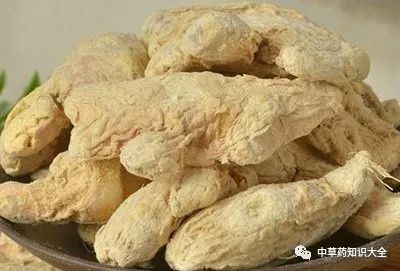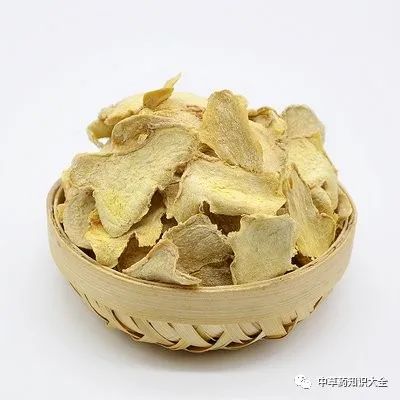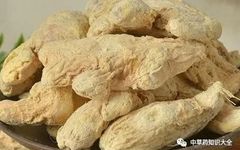PinyinGān Jiānɡ

Alias Bai Jiang, Jun Jiang, Gan Sheng Jiang (Dried Ginger) (《纲目》).
Source 《本经》
Origin The dried rhizome of the ginger plant (Zingiber officinale). It is harvested in winter when the stems and leaves wither, cleaned of stems, roots, and soil, then dried in the sun or with gentle heat.

Form For detailed morphology, refer to “Sheng Jiang” (Fresh Ginger).
Habitat Distribution Grown in most regions of the country, primarily produced in Sichuan, Guizhou, and other areas.
Characteristics The dried rhizome is flat, irregularly shaped, with finger-like branches. It measures 4-6 cm in length and 0.4-2 cm in thickness. The surface is grayish-white or grayish-yellow, rough, with longitudinal wrinkles and distinct nodes; at the branching points, remnants of scale leaves are often present. It is solid in texture, with a grayish-white or light yellow cross-section, and if loose, shows fibrous veins with small oil spots and a distinct ring pattern. It has a fragrant aroma and a spicy taste. The best quality is firm, with a grayish-yellow outer skin, grayish-white interior, and a powdery cross-section with few fibrous veins.
Preparation Dried Ginger: Remove impurities, soak in water for 3-6 hours, drain, steam, and then slice or cut into small cubes and dry in the sun. Prepared Ginger: Take ginger pieces, stir-fry in a pot over high heat until puffed and the outer skin turns a charred yellow while the inside turns yellow, then sprinkle with a little water and dry.
Taste and Properties Spicy, hot.
① 《本经》: “Taste is spicy, warm.”
② 《别录》: “Very hot, non-toxic.”
③ 《药性论》: “Taste is bitter and spicy.”
Meridians Entered Enters the Spleen, Stomach, and Lung meridians.
① 《本草经解》: “Enters the Liver, Lung, and Kidney meridians.”
② 《得配本草》: “Dried Ginger enters the Hand Shaoyin and Foot Taiyin meridian Qi; Prepared Ginger enters the Foot Taiyin meridian blood division.”
Functions and Indications Warms the middle, expels cold, restores Yang, and unblocks meridians. Treats cold pain in the heart and abdomen, vomiting and diarrhea, cold limbs with weak pulse, cough due to cold, wind-cold-damp obstruction, Yang deficiency with vomiting, epistaxis, and blood in stool.
① 《本经》: “Indicated for chest fullness, cough, reverse Qi, warms the middle, stops bleeding, induces sweating, expels wind-damp obstruction, and treats diarrhea. Fresh is especially good.”
② 《别录》: “Treats cold abdominal pain, food poisoning, cholera, distension, wind evil toxins, and stops blood-tinged saliva.”
③ 《药性论》: “Treats cold pain in the waist and kidneys, cold Qi, breaks blood, expels wind, unblocks joints, opens the five zang and six fu organs, expels wind-damp cold obstruction, and frequent urination at night. Treats cough, warms the middle, persistent cholera, abdominal pain, reduces distension and cold diarrhea, and treats blood stasis. For patients who are weak and cold, it is advisable to use more.”
④ 《唐本草》: “Treats wind, reduces Qi, stops bleeding, unblocks meridians, and induces slight sweating.”
⑤ 《日华子本草》: “Eliminates phlegm, reduces Qi, treats cramps, vomiting and diarrhea, cold in the abdomen, reverse stomach, dry heaving, blood stasis, and stops excessive nasal discharge, resolves cold and heat toxins, opens the appetite, and eliminates food stagnation.”
⑥ 《医学启源》: “《主治秘要》 states, unblocks heart Qi, assists Yang, expels cold from the organs, and releases cold Qi from the meridians, treating cold abdominal pain due to cold invasion.”
⑦ Wang Haogu: “Indicated for cold obstruction in the heart, prolonged eye issues.” “Prepared warms the Spleen and dries the Stomach.”
⑧ 《医学入门》: “Prepared Ginger warms the Spleen and Stomach, treats internal cold water leakage, diarrhea, and abdominal distension, cold pain in the heart and abdomen, stops epistaxis, blood-tinged saliva, blood diarrhea, and menorrhagia.”
⑨ 《药品化义》: “Prepared Ginger reduces deficiency heat.”
⑩ 《长沙药解》: “Dries dampness, warms the middle, moves stagnation, reduces turbidity, calms cough, lifts prolapse, and stops diarrhea.”
Dosage Internal use: decoction, 1.5-4.5 grams.
Precautions Contraindicated in cases of Yin deficiency with internal heat, and blood heat causing reckless movement. Pregnant women should use with caution.
① 《本草经集注》: “Qin Jiao is a guiding herb. Avoid Huang Lian, Huang Qin, and Tian Shu Shi. It is incompatible with Ban Xia and the toxic herb, Lantana.”
② 《本草经疏》: “Long-term use damages Yin and harms the eyes. Yin deficiency with internal heat, Yin deficiency cough with blood, exterior deficiency with heat sweating, spontaneous sweating, toxic blood leading to blood in stool, heat causing vomiting and aversion to cold, abdominal pain due to heat, should all be avoided.”
Formulas ① For sudden heart pain: Dried Ginger powder, warm wine, take a small spoonful, repeat six or seven times until healed. (《补缺肘后方》)
② For Shaoyin disease with clear diarrhea, internal cold and external heat, cold hands and feet, weak pulse, and a red face: Licorice 60 grams (roasted), Aconite 1 piece (raw, peeled, broken into eight pieces), Dried Ginger 120 grams (strong individuals may use 160 grams). Combine these three ingredients with three liters of water, boil down to 1.2 liters, strain, and take warm. If the pulse returns, the patient is cured. (《伤寒论》通脉四逆汤)
③ For cold water diarrhea: Dried Ginger (prepared) ground into powder, take 6 grams with water. (《千金方》)
④ For dizziness and vomiting: Sichuan Dried Ginger 60 grams (prepared), Licorice 30 grams (roasted red). Grind these two into a coarse powder. Each dose is 15-20 grams, boiled in two cups of water until reduced to one cup, taken hot before meals. (《传信适用方》止逆汤)
⑤ For persistent vomiting during pregnancy: Dried Ginger and Ginseng each 30 grams, Pinellia 60 grams. Grind these three into powder, mix with fresh ginger juice to form pills the size of a walnut. Take ten pills three times a day. (《金匮要略》干姜人参半夏丸)
⑥ For recurrence of sweating after treating cold: Dried Ginger 30 grams, Aconite 1 piece (raw, peeled, cut into eight pieces). Combine these two with three liters of water, boil down to one liter, strain, and take all at once. (《伤寒论》干姜附子汤)
⑦ For Spleen cold malaria: ㈠ Dried Ginger and Galanga in equal parts, ground into powder. Each dose is 3 grams, boiled in one cup of water until reduced to 70 ml. ㈡ Dried Ginger roasted black, ground into powder, take 9 grams with warm wine at the onset. (《外台》)
⑧ For cold dysentery with blue color: Dried Ginger cut into bean-sized pieces, take 6-7 pieces with sea rice and water three times a day. (《补缺肘后方》)
⑨ For persistent vomiting of blood: Dried Ginger ground into powder, take 3 grams with a boy’s urine. (《千金方》)
⑩ For vomiting and blood in stool: Angelica, Ejiao each 24 grams, Chuanxiong 15 grams, Puhuang 10 grams, Baiye 15 grams, roasted Ginger carbonized 7 grams. Boil these in water, and take with powdered herbs. (《观聚方要补》断红饮)
⑪ For Spleen and Stomach deficiency, reduced appetite, easy to injure and difficult to transform, weakness, and thin muscles: Dried Ginger (frequently ground) 120 grams, mixed with white syrup, cut into pieces, water-bathed, melted in an iron pan, and formed into pills the size of a walnut. Take thirty pills on an empty stomach with rice. (《十便良方》)
⑫ For kidney-related diseases, with heavy body, cold in the waist as if sitting in water, resembling water-like form, no thirst, frequent urination, normal appetite, belonging to the lower jiao, cold pain below the waist, heavy abdomen: Licorice, Bai Zhu each 60 grams, Dried Ginger, Fu Ling each 120 grams. Combine these four with five liters of water, boil down to three liters, take warm in three doses. (《金匮要略》干姜苓术汤)
⑬ For sudden red eyes: White Ginger powder mixed with water, applied to the soles of the feet. (《普济方》)
⑭ For initial stage of carbuncles: Dried Ginger 30 grams, roasted purple, ground into powder, mixed with vinegar and applied around, leaving the head exposed. (《诸症辨疑》)
Source: Comprehensive Knowledge of Chinese Herbal Medicine

